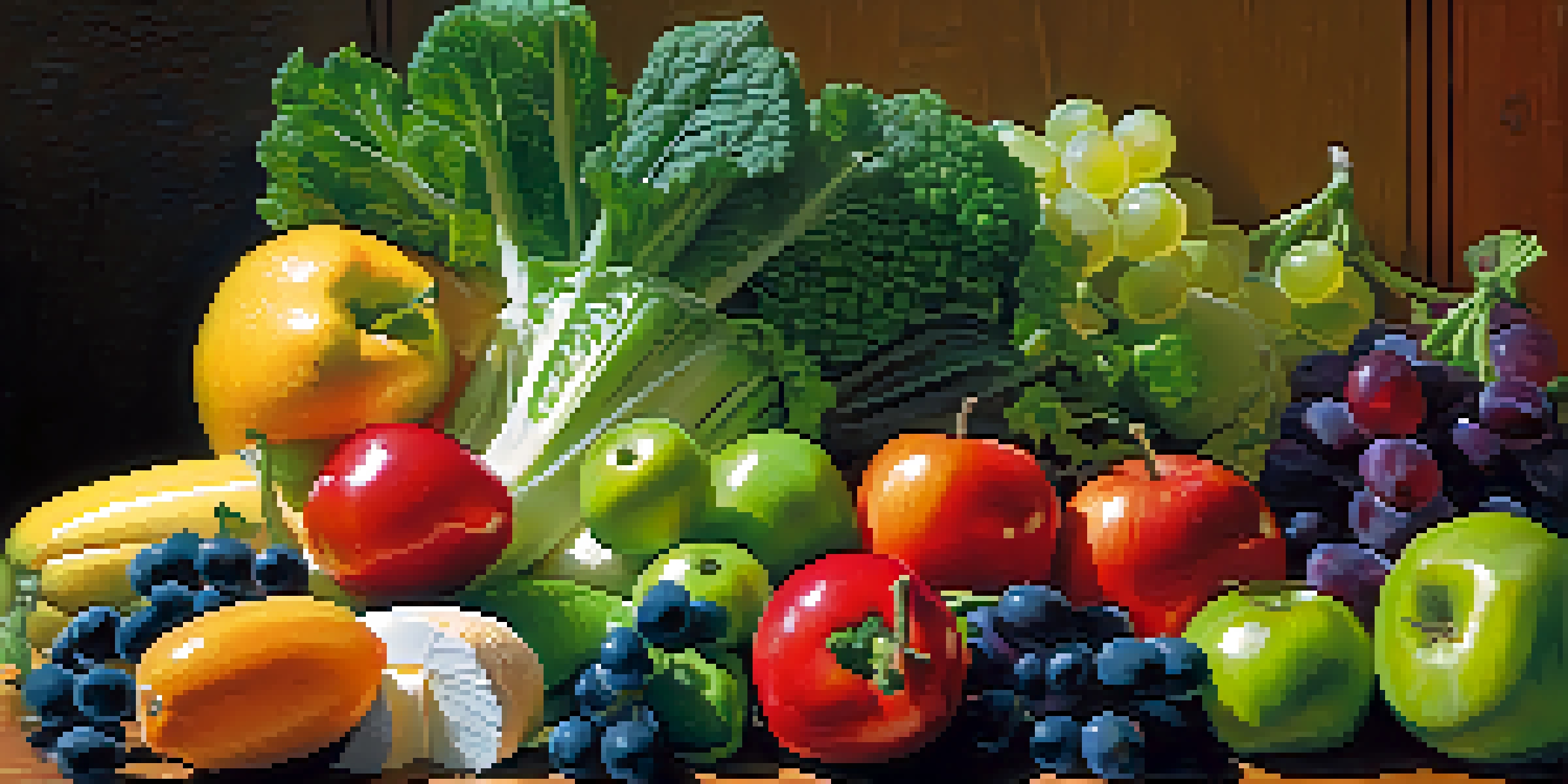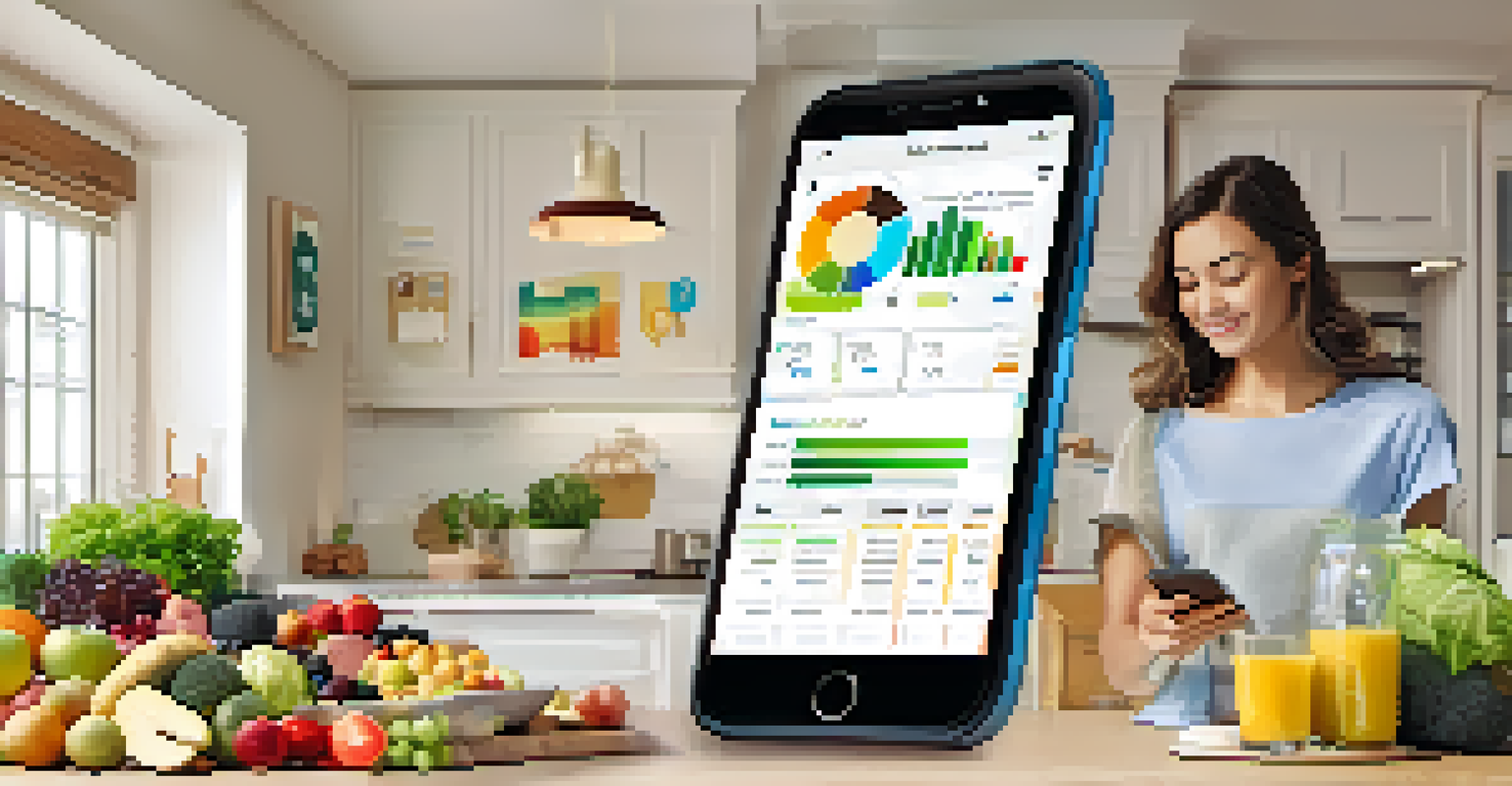Assessing Your Nutrition: Tools for Self-Evaluation

Understanding the Importance of Nutrition Self-Evaluation
Self-evaluation of nutrition is crucial for maintaining a balanced diet. By regularly assessing what you eat, you can identify areas for improvement and ensure you're meeting your nutritional needs. Think of it as a tune-up for your body, helping you perform at your best.
Let food be thy medicine and medicine be thy food.
Moreover, understanding your nutritional habits can lead to better health outcomes. For instance, realizing that you're consuming too much sugar can motivate you to make healthier choices. This proactive approach can help prevent chronic diseases and enhance your overall well-being.
In essence, nutrition self-evaluation empowers you to take control of your health. It's not just about tracking calories; it's about understanding the quality of the food you consume and how it affects your body. This awareness can set the foundation for a healthier lifestyle.
Setting Clear Nutrition Goals for Your Self-Assessment
Before diving into self-evaluation tools, it’s essential to set clear nutrition goals. These goals should be specific, measurable, achievable, relevant, and time-bound (SMART). For example, instead of saying, 'I want to eat healthier,' a SMART goal could be, 'I will eat five servings of fruits and vegetables each day for the next month.'

Having specific goals not only gives you direction but also makes tracking your progress more straightforward. You can easily measure your success and adjust your strategies as needed. This clarity helps keep you motivated and focused on your nutrition journey.
Self-Evaluation Enhances Health
Regularly assessing your nutrition helps identify areas for improvement, empowering you to take control of your health.
Remember, your goals can evolve over time as you learn more about your body and its needs. Regularly revisiting and updating your goals ensures they remain relevant and achievable, making your self-assessment more effective.
Utilizing Food Journals for Effective Self-Assessment
One of the most effective tools for assessing your nutrition is a food journal. By writing down everything you eat and drink, you create a clear picture of your dietary habits. This practice can help you identify patterns, such as binge eating or emotional eating triggers.
You are what you eat, so don’t be fast, cheap, easy, or fake.
A food journal also encourages mindfulness around your eating choices. When you know you'll be recording your meals, you might think twice before reaching for that extra slice of cake. Over time, this increased awareness can lead to healthier eating habits.
Additionally, reviewing your food journal can highlight areas where you might be lacking essential nutrients. If you notice that your meals are low in vegetables, for instance, you can make a conscious effort to incorporate more greens into your diet.
Exploring Mobile Apps for Nutrition Tracking
In today's digital age, mobile apps can be fantastic companions for nutrition self-evaluation. Many apps allow you to log your meals, track calories, and analyze your nutrient intake with just a few taps on your smartphone. This convenience makes it easier to stay accountable and engaged in your dietary choices.
Some popular apps even provide personalized recommendations based on your goals and preferences. For instance, if you aim to increase your protein intake, the app can suggest high-protein recipes and food swaps. This tailored approach can simplify your journey toward better nutrition.
Set SMART Nutrition Goals
Establishing specific, measurable, achievable, relevant, and time-bound goals provides clear direction for your nutrition journey.
Moreover, many nutrition tracking apps include community features where you can connect with others who share similar goals. This sense of community can offer motivation and support, making your self-assessment journey feel less isolating.
The Role of Nutrition Labels in Self-Evaluation
Nutrition labels are vital tools that can greatly assist in your self-evaluation of nutrition. By reading labels, you gain insights into the nutritional content of the foods you consume, including calories, fats, sugars, and vitamins. This information helps you make informed choices that align with your health goals.
Understanding how to interpret nutrition labels can empower you to spot hidden sugars or unhealthy fats in packaged foods. For instance, a product may advertise as 'low-fat,' but upon closer inspection, you might find it's loaded with sugar. This knowledge can help you avoid misleading marketing claims.
Incorporating label reading into your shopping routine not only improves your nutrition but also fosters a greater awareness of processed foods. Over time, you may find yourself gravitating towards whole, unprocessed foods that offer more nutritional value.
Consulting with Nutrition Experts for Personalized Guidance
While self-evaluation tools are incredibly helpful, consulting with nutrition experts can provide personalized guidance tailored to your unique needs. Registered dietitians, for instance, can offer valuable insights based on your health goals, lifestyle, and dietary preferences. This professional advice can enhance the effectiveness of your self-assessment.
A nutritionist can help you interpret the data you've gathered from your food journal or app and provide recommendations for improvement. They can also assist you in setting realistic goals and developing a sustainable meal plan that fits your lifestyle.
Leverage Tools for Success
Utilizing food journals and mobile apps can promote mindfulness and accountability in your eating habits.
Working with an expert adds a layer of accountability to your nutrition journey. Knowing that someone is there to support and guide you can motivate you to stick to your self-evaluation efforts and embrace healthier habits.
Reflecting on Progress and Adjusting Your Nutrition Plan
As you embark on your nutrition self-evaluation journey, it's important to regularly reflect on your progress. Take time to review your food journal, app data, or feedback from a nutrition expert to see how far you've come. Celebrating small victories can boost your motivation and commitment to your nutritional goals.
Reflection also allows you to identify areas that may need adjustment. If you notice that certain goals are too challenging or that you're consistently falling short in a specific area, it might be time to reevaluate your approach. Flexibility is key in sustaining long-term dietary changes.

Ultimately, the journey of assessing your nutrition is ongoing. By regularly reflecting and adjusting your plan, you can ensure it remains relevant and effective, leading to lasting improvements in your health and well-being.